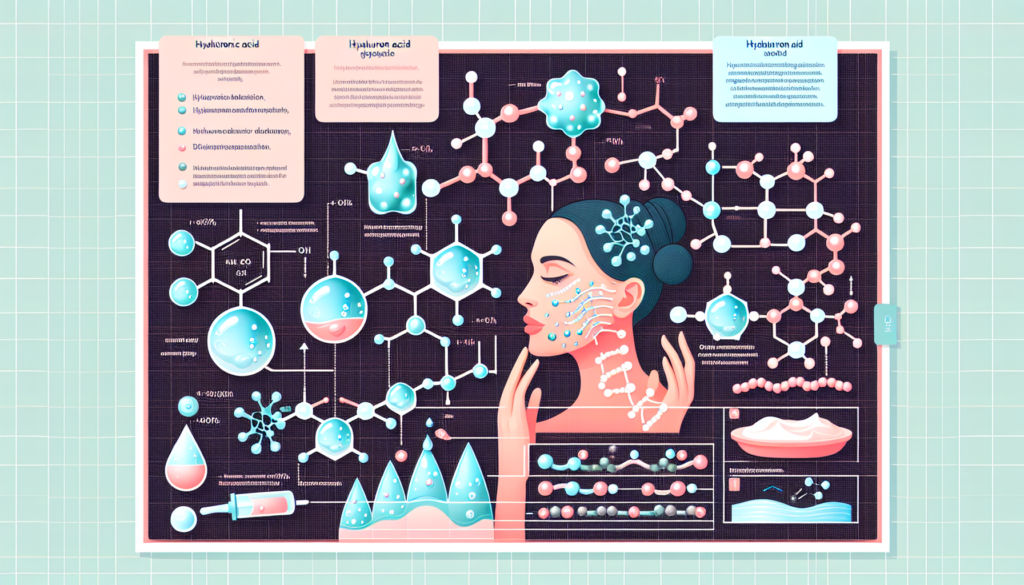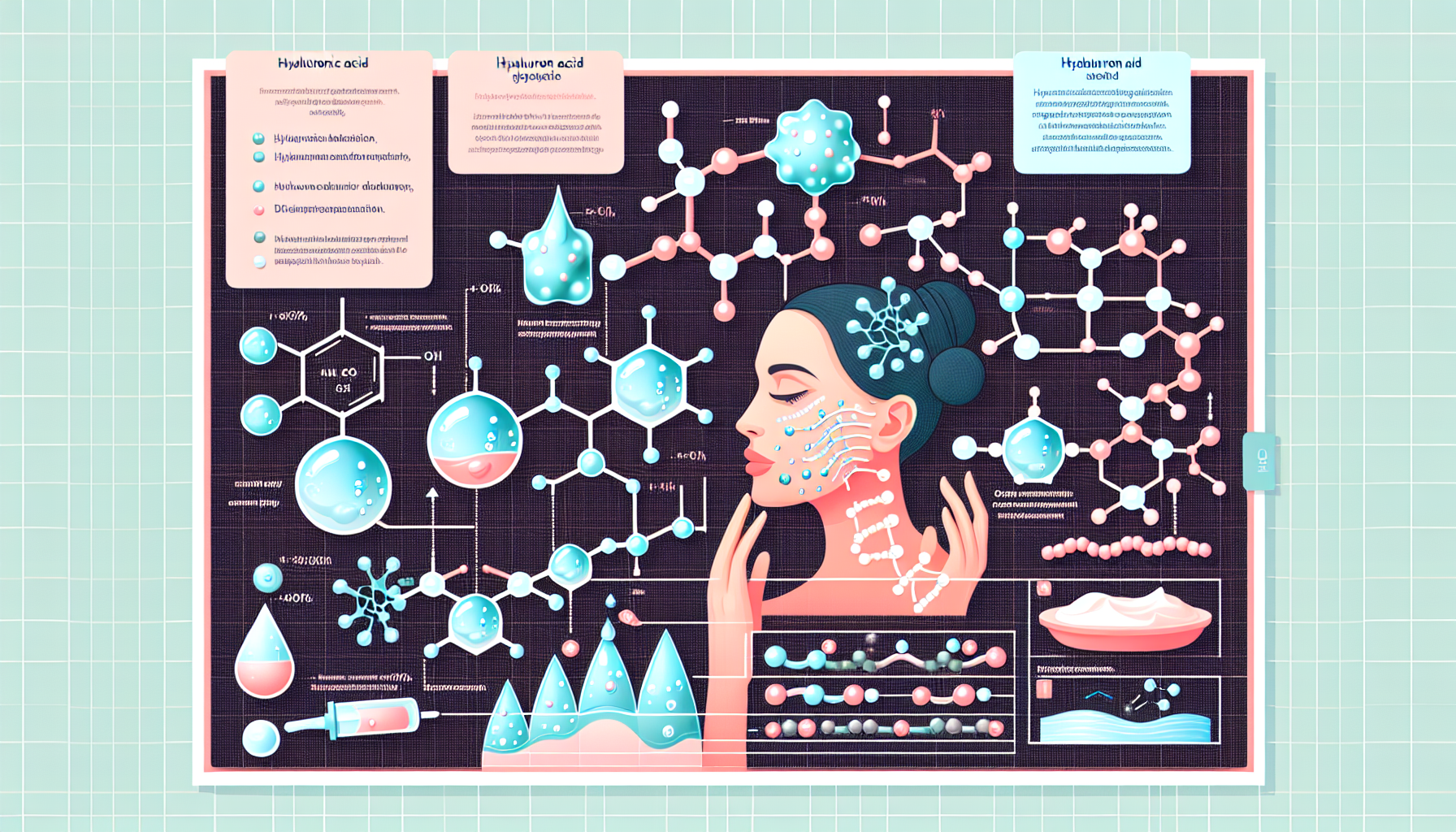If you’ve ever wondered what makes your skin plump and moisturized, look no further than hyaluronic acid. This essential ingredient plays a crucial role in skin hydration, ensuring your skin stays nourished and supple. In this article, we’ll explore the remarkable benefits of hyaluronic acid, how it works, and why it’s a skincare superstar you should definitely be acquainted with. Prepare to unlock the secrets of a hydrated and glowing complexion.

Understanding Hyaluronic Acid
Definition of Hyaluronic Acid
Hyaluronic Acid (HA) is a naturally occurring substance in the human body that is crucial for maintaining healthy skin. It is a glycosaminoglycan, which is a type of molecule responsible for retaining moisture and providing structure to the skin. HA has a unique ability to hold on to large amounts of water, which makes it an excellent agent for skin hydration.
Natural occurrences of Hyaluronic Acid in the human body
Hyaluronic Acid is present in various parts of the human body, with the highest concentration found in the skin, eyes, and joints. It is produced by specialized cells called fibroblasts and is found in the extracellular matrix, which is the substance that supports and hydrates cells. As we age, the natural production of HA decreases, leading to decreased skin hydration and the appearance of fine lines and wrinkles.
The Role of Hyaluronic Acid in the Body
Functioning of Hyaluronic Acid in the body
Hyaluronic Acid plays a vital role in maintaining the overall health and functionality of the body. Its primary function is to retain water, keeping the tissues well lubricated and moist. This is especially important for joints, as HA acts as a shock absorber, reducing friction and cushioning the bones. Additionally, HA contributes to the flexibility and resilience of cartilage, making it crucial for joint mobility.
Hyaluronic Acid’s role in skin health
In the skin, Hyaluronic Acid is responsible for maintaining moisture balance, promoting elasticity, and providing a plump and youthful appearance. It acts as a humectant, drawing water from the environment into the skin and preventing moisture loss. HA also supports the skin’s natural protective barrier, keeping harmful substances from entering and keeping essential nutrients locked in.
Hyaluronic Acid and Skin Hydration
Mechanism of Hyaluronic Acid’s hydration effects
Hyaluronic Acid’s ability to hold onto water is what makes it an excellent hydrating agent for the skin. When applied topically or injected into the skin, HA forms a moisture-retaining barrier on the skin’s surface, preventing water loss and maintaining optimal hydration levels. It attracts and binds water molecules, creating a plumping effect that reduces the appearance of fine lines and wrinkles.
Benefits of Hyaluronic Acid for skin hydration
The benefits of Hyaluronic Acid for skin hydration are numerous. It replenishes and retains moisture, providing deep hydration that helps smooth and soften the skin. This hydration effect can improve the overall texture and tone of the skin, making it look more youthful and radiant. In addition, HA’s moisturizing properties can alleviate dryness, itching, and irritation, making it suitable for individuals with sensitive or dry skin.
Types of Hyaluronic Acid for Skin Hydration
Serums and creams
Hyaluronic Acid is widely available in the form of serums and creams that can be applied topically to the skin. These products typically contain a concentration of HA that can penetrate the skin and provide intense hydration. Serums are lightweight and easily absorbed, making them suitable for all skin types. Creams, on the other hand, have a thicker consistency and are ideal for those with dry or mature skin.
Supplements and injections
Hyaluronic Acid can also be taken internally as a supplement or injected directly into the skin. Supplements work by providing the body with an additional source of HA, which can promote overall hydration and skin health. Injections, such as dermal fillers, deliver HA directly into specific areas of the skin, adding volume and reducing the appearance of wrinkles. These methods are typically performed by trained professionals.

Application of Hyaluronic Acid in Dermatology
Use in cosmetic procedures
Hyaluronic Acid is commonly used in various cosmetic procedures to improve skin hydration and overall appearance. Dermal fillers, which contain HA, are used to plump up lips, fill in lines and wrinkles, and restore volume to the face. These treatments can give a more youthful and rejuvenated look. Additionally, HA-based products are used in non-surgical facelift procedures, providing a less invasive alternative to traditional surgical methods.
Use in treating dry skin conditions
Because of its excellent hydrating properties, Hyaluronic Acid is also utilized in the treatment of dry skin conditions such as eczema and psoriasis. It helps to restore the skin’s moisture barrier, preventing water loss and reducing redness and itching. HA-based creams and ointments can provide relief for individuals with these chronic skin conditions and help improve the overall health and comfort of their skin.
Use in anti-aging treatments
As we age, the natural production of Hyaluronic Acid in the body decreases, leading to the formation of wrinkles and loss of elasticity. To combat these signs of aging, HA-based products are frequently used in anti-aging treatments. By replenishing the skin’s HA levels, these treatments restore moisture, improve texture, and reduce the appearance of fine lines and wrinkles.
Efficacy of Hyaluronic Acid on Skin Hydration
Scientific studies backing its hydration properties
Numerous scientific studies have been conducted to evaluate the efficacy of Hyaluronic Acid on skin hydration. These studies have consistently shown that HA can effectively improve skin moisture content by attracting and retaining water. One study published in the Journal of Drugs in Dermatology demonstrated that HA-based serums significantly increased skin hydration levels after just a few weeks of use.
Personal anecdotes and testimonials
In addition to scientific studies, many individuals have shared their personal experiences with using Hyaluronic Acid for skin hydration. Countless testimonials tout the transformative effects of HA, with people reporting smoother, more supple skin and a visible reduction in dryness and wrinkles. These personal anecdotes further support the efficacy of HA and its ability to provide long-lasting hydration.
Side Effects and Considerations of Hyaluronic Acid Use
Possible side effects
While Hyaluronic Acid is generally safe for most people, there are potential side effects to consider. These can include redness, swelling, or irritation at the injection site. It is crucial to ensure that any HA-based treatments or products are obtained from reputable sources and administered by trained professionals to minimize the risk of adverse effects.
Who should avoid Hyaluronic Acid
Individuals with a history of allergic reactions or hypersensitivity to HA should avoid the use of HA-based products. Pregnant or breastfeeding individuals should consult with their healthcare provider before using these products. It is always recommended to perform a patch test before incorporating new skincare products or treatments into your routine to check for any adverse reactions.
How to Use Hyaluronic Acid for Maximum Hydration
Best practices for application
To effectively use Hyaluronic Acid for maximum hydration, it is essential to apply it on clean, slightly damp skin. This helps to lock in the moisture and enhance the absorption of HA. Start with a small amount and gently massage it into the skin until fully absorbed. Follow up with a moisturizer to seal in the hydration. Regular and consistent use is key to achieving optimal results.
Combining with other skincare products
Hyaluronic Acid can be incorporated into your existing skincare routine by combining it with other compatible products. It can be layered with lightweight serums, moisturizers, and sunscreen to provide an additional boost of hydration. Combining HA with products containing ingredients like vitamin C or peptides can also enhance the overall benefits for the skin.
Alternatives to Hyaluronic Acid for Skin Hydration
Other natural ingredients
While Hyaluronic Acid is highly effective for skin hydration, there are other natural ingredients that can provide similar benefits. These include glycerin, aloe vera, and ceramides, which all possess hydrating properties and help replenish the skin’s moisture barrier. Incorporating products containing these ingredients into your routine can provide an alternative for those who may have sensitivities to HA.
Synthetic alternatives
In addition to natural alternatives, there are also synthetic alternatives to Hyaluronic Acid available in the market. These include peptides, squalane, and various synthetic polymers that mimic the water-binding properties of HA. While these alternatives may provide similar hydration benefits, it is important to research and choose products from reputable sources to ensure safety and efficacy.
Future of Hyaluronic Acid in Skincare
Areas of ongoing research
Research on Hyaluronic Acid is ongoing, and there are several areas of interest within the scientific community. Scientists are exploring ways to enhance the delivery of HA into the skin, improve its longevity, and develop new formulations to optimize its hydrating effects. Additionally, studies are being conducted to investigate the potential of HA in wound healing and tissue regeneration.
Potential new applications and innovations
The future of Hyaluronic Acid in skincare holds exciting possibilities. New applications and innovations that combine HA with other ingredients or technologies may enhance its effectiveness even further. The development of HA-based products that can target specific skin concerns, such as hyperpigmentation or acne, is a potential direction for future research. As science advances, we can expect to see more innovative uses of Hyaluronic Acid in skincare.
In conclusion, Hyaluronic Acid plays a vital role in skin hydration, promoting moisture retention and improving the overall health and appearance of the skin. Its unique ability to attract and hold on to water makes it an essential ingredient in skincare products and treatments. With its proven efficacy, minimal side effects, and growing scientific interest, Hyaluronic Acid is a valuable asset in the pursuit of optimum skin hydration. Whether applied topically or used internally, HA offers a multitude of benefits, helping you achieve and maintain a hydrated and youthful complexion.
